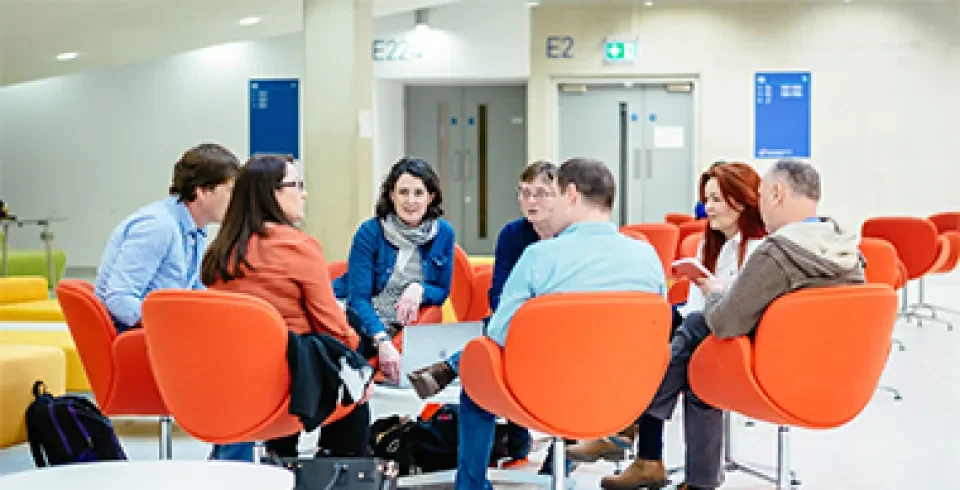
Communities of Practice (CoP)

Teaching Conversations
The TEU host and support a number of professional learning communities as spaces for staff to meet peers and share ideas about approaches to teaching with the goal of learning from one another.
DCU is committed to recognising teaching excellence through Advance HE Recognition. Advance HE Fellowship demonstrates a personal and institutional commitment to professionalism in learning and teaching in higher education.
DCU has seen over 100 Principal, Senior, Fellow, and Associate Fellows gain this recognition since the launch of the Fellowship scheme in 2019. There continues to be strong interest in pursuing Fellowship across a range of Fellowship categories and the TEU runs a supported journey to help staff complete the application process and develop the growing community of fellows at DCU.
A small group of DCU academics across all five faculties are using interactive oral assessments as a viable alternative to traditional assessments. They meet weekly as part of a community of practice (CoP). The CoP is led by TEU in collaboration with Griffith University. Griffith University has extensive experience, and a body of evidence-based research to show that interactive orals are an authentic assessment approach that effectively helps prepare students for employment, and when used as part of strategically designed integrated assessment, promotes academic integrity.
This short 2 min. video provides a quick introduction to the approach through the voices of both students and academics involved in the initiative.
A TEU Interactive Oral User Guide is also available to support academics wishing to use this approach.
An exciting enhancement to the DCU Interactive Oral CoP is a shared Interactive Oral CoP with Griffith University and Charles Sturt University in Australia. The first meeting was held on 24th November 2021, hosted by the TEU. At a two hour meeting over twenty academics (eight from DCU) presented vignettes of their use of interactive oral across all disciplines. This shared CoP will continue to meet twice a year to collaborate and share experience and research in this space.
Colleagues who may be interested in joining the IO Community of Practice, please contact Lily (lily.girme@dcu.ie) to be added to the CoP list.
MoodleMunch is a community of practice centred around Moodle and related digital learning tools. The community comes together in monthly lunchtime webinar series, led by Dublin City University and supported by the National Forum for the Enhancement of Teaching and Learning.
Members share knowledge, good practice and innovations from their own institutions. It provides is an opportunity to learn from one another, get a flavour of Moodle activity taking place across various regions, chew the fat, digest interesting developments and munch on ideas!
In keeping with Moodle’s mission to empower educators, each webinar explores Moodle innovations and stories that support the development of educators’ competencies on the European Framework for the Digital Competence of Educators (DigCompEdu).
We view Peer Observation as a collaborative partnership between two (or more) academics who observe each other's teaching, offer each other constructive feedback on their teaching, and reflect on their teaching based on both what was observed and their colleague’s feedback. The benefits of Peer Observation are often cited as improving teaching practice; enhancing commitment to teaching; confidence-building among staff; increased awareness of students’ needs in the classroom and the transformation of teachers' educational perspectives. Benefits accrue to both observer and observee, and for both novice and experienced teachers.
The TEU provide support and advice to staff on getting started with Peer Observation and more details can be found here.
The Sipping Point is a space for conversations about teaching which aims to encourage the sharing of teaching practice and the spread of new ideas. Facilitated by the TEU, it takes the form of non-formal, one-hour sessions where staff get the opportunity to discuss teaching-related topics with peers. These events usually start with short talks by two speakers after which the topic is thrown open to the floor for questions and discussion. Ideas for each session are drawn from prior consultation with staff and abstracts are circulated in advance so that participants can come to the event with an awareness of the core theme.
Running at DCU since April 2017, feedback to date has been very positive. As one academic participant says:
‘I think it’s a really valuable initiative and I hope that it continues. I like that you can dip into topics in a lunchtime session without feeling too intimidated and leave having learned something new, or with ideas for a new approach to teaching.’
More details about The Sipping Point (including information on previous topics and upcoming sessions) can be found here. You can also access a case study about The Sipping Point via the following link:
Gormley, C. (2021). It's good to talk: Exploring the influence of facilitated teaching conversations at an Irish university. Innovations in Education and Teaching International, DOI: https://doi.org/10.1080/14703297.2021.1905029
